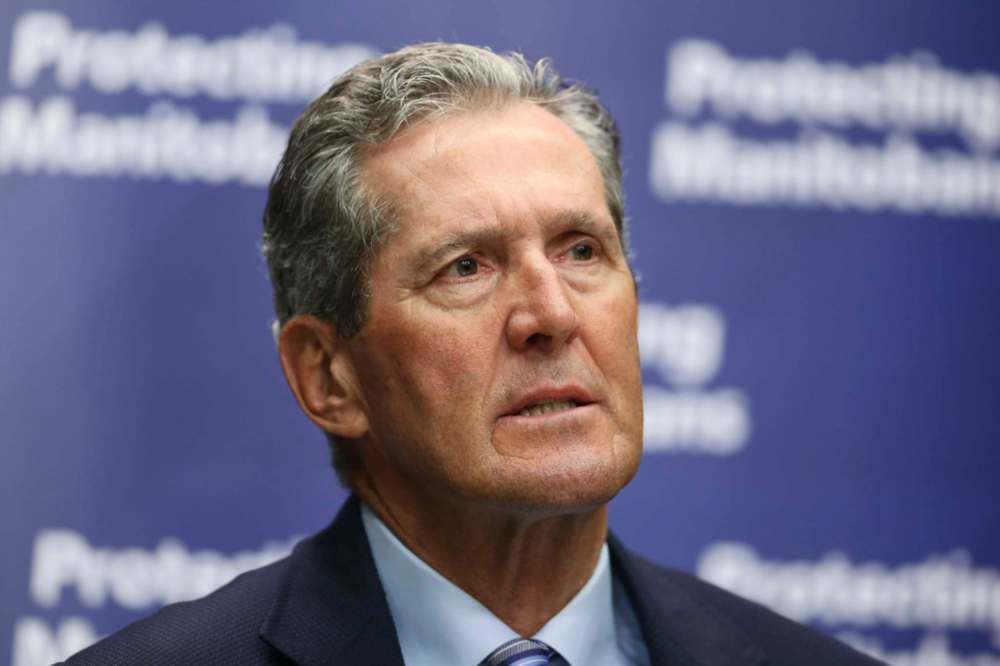Premier refuses to address worst-case scenario for ICUs Have no fear, Pallister says, Alberta has beds for Manitobans
Read this article for free:
or
Already have an account? Log in here »
To continue reading, please subscribe:
Monthly Digital Subscription
$0 for the first 4 weeks*
- Enjoy unlimited reading on winnipegfreepress.com
- Read the E-Edition, our digital replica newspaper
- Access News Break, our award-winning app
- Play interactive puzzles
*No charge for 4 weeks then price increases to the regular rate of $19.00 plus GST every four weeks. Offer available to new and qualified returning subscribers only. Cancel any time.
Monthly Digital Subscription
$4.75/week*
- Enjoy unlimited reading on winnipegfreepress.com
- Read the E-Edition, our digital replica newspaper
- Access News Break, our award-winning app
- Play interactive puzzles
*Billed as $19 plus GST every four weeks. Cancel any time.
To continue reading, please subscribe:
Add Free Press access to your Brandon Sun subscription for only an additional
$1 for the first 4 weeks*
*Your next subscription payment will increase by $1.00 and you will be charged $16.99 plus GST for four weeks. After four weeks, your payment will increase to $23.99 plus GST every four weeks.
Read unlimited articles for free today:
or
Already have an account? Log in here »
Hey there, time traveller!
This article was published 03/06/2021 (1652 days ago), so information in it may no longer be current.
Premier Brian Pallister said he doesn’t know if it’s “helpful” to discuss the “worst-case scenario,” even as the rising number of COVID-19 ICU admissions isn’t expected to peak until next week, and 51 patients have been transferred to other provinces.
At a press conference Thursday, the premier didn’t answer questions about a contingency plan, had other provinces not been able to take COVID-19 patients from Manitoba’s overwhelmed ICUs.
“I’m really happy and I’m thankful that other provinces were able to support us in our time of need as we’ve always supported others in their time of need,” Pallister said.

The briefing was held before Shared Health reported the death of a woman in her 50s, who’d been transported to an Ontario hospital on May 23. The deaths of five people with COVID-19 in Manitoba were also reported Thursday.
When asked what will happen if other provinces can no longer take ICU patients from Manitoba, Pallister was dismissive.
“Because the capacity is there, because we were later coming into the third wave, other provinces had passed their peak. There was the capacity in other jurisdictions,” he said.
Manitoba reported 360 new cases of COVID-19 Thursday and the unprecedented surge of ICU admissions continued with another seven patients admitted in a 24-hour period Wednesday.
“I’m really happy and I’m thankful that other provinces were able to support us in our time of need as we’ve always supported others in their time of need.”
– Manitoba Premier Brian Pallister
“I don’t know that it’s that helpful to talk about the worst-case scenario that could have happened if every province in Canada had their peak at exactly the same time,” he said. “That wouldn’t have been a good thing. I think we all know that.”
His government has adapted “as every other government has,” Pallister said. However, no other province has had to send critically ill COVID-19 patients out of province for care.
Admissions to Manitoba ICUs are expected to peak in the next week, following the surge in daily new COVID-19 cases two weeks ago. They reached as high as 603 on May 20. Despite the grim situation, Pallister maintained he isn’t alarmed about Manitoba’s lack of ICU capacity.
Friendly wager
Premier Brian Pallister won’t entertain a worst-case scenario for Manitoba’s overwhelmed intensive care units — or the Winnipeg Jets, for that matter.
Pallister said he made a”friendly wager” with Quebec Premier Francois Legault: if the Montreal Canadiens win their seven-game NHL playoff series against the Jets, the Manitoba premier will wear a Habs jersey. Although the Canadiens beat the Jets 5-3 Wednesday in Game One, Pallister remained optimistic.
“Just as we’re going to fight from behind with COVID and be successful, so too the Winnipeg Jets will fight from behind and beat the Habs,” he declared.
“There’s no reason for Manitobans to fear in that respect, ” the premier said. “Alberta has a significant number of additional beds.”
Alberta Health Services said Wednesday it could take up to 10 Manitoba ICU patients.
“Manitobans have been giving and helpful to everybody else in the Canadian family throughout our history, so I don’t feel badly asking for help and I’m sure thankful that we’re able to get it.”
Pallister said he’s “glad” the pandemic didn’t happen in 2016 when his party was elected into government. He claimed it inherited a “mess” in understaffed ICUs and emergency departments. He said they’ve since doubled the ICU bed capacity. “That’s an incredible accomplishment and it still isn’t enough.”
On Thursday, it was expected Alberta would receive its first Manitoba COVID-19 patient. Three more Manitobans in the ICU were transported to Ontario hospitals on Wednesday, Shared Health’s daily bulletin said.
The number of Manitobans so sick with COVID-19 that they need to be admitted to hospital is expected to keep rising, said Dr. Jazz Atwal, deputy chief provincial public health officer.
“Manitobans have been giving and helpful to everybody else in the Canadian family throughout our history, so I don’t feel badly asking for help and I’m sure thankful that we’re able to get it.”
– Manitoba Premier Brian Pallister
“Over the next one to two weeks, I still see potentially numbers increasing,” Atwal said Thursday. “I’m hoping they’re plateauing — but it wouldn’t surprise me to see another 10 or 15 per cent increase. That’s not out of the question.”
Of the 51 ICU patients with COVID-19 transported out of province since May 18, 49 went to Ontario and two to Saskatchewan. Ten have since returned to Manitoba; two have died.
Expenses associated with the transport of patients are covered by the government, a Shared Health spokesman said. That includes “the safe and respectful repatriation of individuals who have died to Manitoba.”
Thursday numbers
The deaths of five Manitobans with COVID-19 were reported Thursday, including a woman in her 40s and a woman in her 70s in the Winnipeg health region, as well as a woman in her 90s linked to the B.1.1.7 variant of concern. A man in his 70s in the Northern health region and a man in his 80s from the Southern Health region, linked to the unspecified variant of concern also died.
On Thursday, Manitoba’s death toll reached 1,067.
The deaths of five Manitobans with COVID-19 were reported Thursday, including a woman in her 40s and a woman in her 70s in the Winnipeg health region, as well as a woman in her 90s linked to the B.1.1.7 variant of concern. A man in his 70s in the Northern health region and a man in his 80s from the Southern Health region, linked to the unspecified variant of concern also died.
On Thursday, Manitoba’s death toll reached 1,067.
The current five-day COVID-19 test positivity rate was 11.5 per cent provincially and 13.2 per cent in Winnipeg Thursday, with 360 new cases of the virus identified: 220 in the Winnipeg region, 56 in Southern Health, 42 in Prairie Mountain, 23 in the Northern region and 19 cases in the Interlake–Eastern region.
There were 4,179 active COVID-19 cases, 212 people in hospital with active COVID-19, as well as 85 people in hospital with COVID-19 who are no longer infectious but continue to require care, for a total of 297 hospitalizations. There were 45 people in intensive care units with active COVID-19, as well as 23 people with COVID-19 who are no longer infectious but continue to require critical care, for a total of 68 ICU patients.
On Wednesday, 2,933 laboratory tests were completed.
The province has agreed to reimburse travel and accommodation costs for an essential-care partner to be close to the transferred ICU patient.
NDP Leader Wab Kinew said the Progressive Conservative government doesn’t seem to have a plan to beef up ICU capacity.
“The speed at which the government of Manitoba is expanding the transportation of ICU patients to other provinces tells me that that’s their only plan. At this stage, it doesn’t seem as though they are taking any measures to staff up ICUs here in Manitoba,” Kinew said Thursday.
The government has been warned for years about the shortage of ICU beds, he said. Those voices have become louder during the second and third waves of the pandemic.
“You would expect at this point that the government would have some plan when it comes to the ICUs. Unfortunately, it looks like all they have are political lines, and that’s just not good enough,” Kinew said.
Because of the Pallister government, Manitoba no longer has a functioning health care system and the resources needed to save lives in a crisis, Liberal Leader Dougald Lamont said.
“The responsibility for that is 100 per cent on the premier and his PC enablers who had ample time, resources, and endless warnings to make better choices,” Lamont wrote in an email.
— with files from Katie May, Larry Kusch and Maggie Macintosh
carol.sanders@freepress.mb.ca

Our newsroom depends on a growing audience of readers to power our journalism. If you are not a paid reader, please consider becoming a subscriber.
Our newsroom depends on its audience of readers to power our journalism. Thank you for your support.





